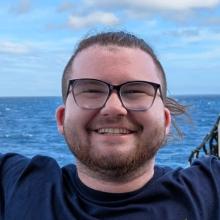
Locke Patton
Tell us about your work/research. What kinds of things do you do?
If I’m trying to impress someone, I tell them I touch lightning for a living. Working as an educator at the Museum of Science in Boston means touching lightning from a two story 93-year-old antique Van de Graff machine every day. But my work involves a complete ecosystem of science communication: from handling a snapping turtle named Bowser during shows or quietly touching bear teeth with a silent 3-year-old through in-gallery learning to creating videos for the Museum’s social media channels and helping maintain our behemoth indoor lightning machines. Every day at work is its own adventure: I might perform a supercold liquid nitrogen show, run an engineering design challenge, write scripts, film in our digital studio, or keep developing deep-sea adventure shows. Eventually, I tackle them all.
What sparked your initial interest in your career?
Naturally, I’ve always been curious. I raised myself on a regular diet of science YouTube videos, but my interest in science has been fueled by lots of tiny moments with incredibly kind teachers and mentors. While growing up on a farm, my father taught me about pressure by having me implode a metal oil can using boiling water and a hose. My science teacher had us shield behind tables while he lit a rocket that left a small hole in the ceiling! Within hours of meeting one of my professors, she put me to work and had me remote control a massive two-story telescope from a laptop five states away. I loved the coding and creative logical thinking involved in doing new astrophysics research, so I went to graduate school at Harvard in Cambridge.
Who influenced you or encouraged you the most?
This feels like an impossible question. I have been formed by thousands of tiny moments of encouragement from teachers, mentors and friends. Finding even one person who is as excited about learning as I am and who truly gets and supports me – it’s been such an incredible gift.
What element of your work/study do you think is the most fascinating?
The most fascinating thing I’ve done lately is climbing inside the world’s largest air insulated Van de Graff machine to help replace three massive belts after one snapped. This three-story antique produces a million volts of electricity – and the Museum of Science uses it to make indoor lightning during shows every day.
How did you get involved with the Ocean Exploration Trust?
I learned about the Ocean Exploration Trust while creating a deep-sea adventure show at the Museum of Science. When I realized that the Ocean Exploration Trust sends informal educators to sea, I jumped at the chance to join an expedition and applied to be a Science Communication Fellow right away.
What other jobs led you to your current career?
Many of the key skills I use day to day were learned on the job – but not the job you might expect. I learned some of the mechanics of fixing lightning machines while working on tractor with my dad on our family farm. I learned how to manage rowdy crowds when I worked at a climbing gym and taught overexcited students who were sometimes determined to risk their lives. But officially on paper, physics and astronomy were my focus. During my undergraduate program, I worked in the introduction physics labs, teaching classes and fixing equipment. I also worked for some of my astronomy professors as an undergraduate researcher, which were the first moments I uncovered a new morsel of science before anyone else even knew. When I got into graduate school at Harvard, I was paid to research space explosions and the galaxies that host exploding stars. I missed the connection to teaching others, so when I found a job opening at the Museum of Science, I jumped into my current career as an informal science educator.
What are your degrees and certifications?
Bachelor of Science in Physics and Astronomy -- University of Washington 2018; Masters in Astrophysics -- Harvard University 2022
What are your hobbies?
I love crochet projects, board games and rock climbing, but my favorite thing to do is take my cat on hikes with my partner, Megan.
What advice would you give someone who wants to have a career like yours?
Lean into your kindness and curiosity – you can learn from everyone. Take the time to listen, learn, and delve into the details, both in the career you want and in areas you don't understand. An entire world of knowledge is available at your fingertips. Lean into avenues of learning that naturally inspire you to learn more. Don't limit yourself before giving something multiple tries - especially if you haven't found someone who teaches in a way that works for you. And of course, when you find someone who gets how you learn and cares about making sure you understand, don't be afraid to ask questions and lean into the experience of trying, failing, and trying again.
Expeditions
Locke participated in the following Ocean Exploration Trust expeditions:
